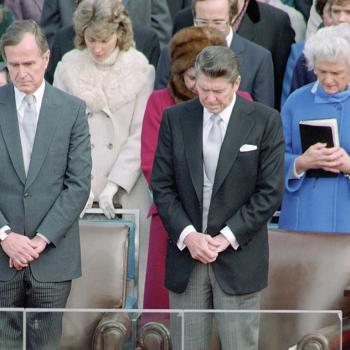Last week I posted about a Ted Cruz rally at which Glenn Beck argued that the Constitution and the Bible were both “sacred scriptures.” What would the Founding Fathers think about this?
It so happens that, in a little-noticed 1788 editorial, Ben Franklin directly denied that the Constitution was “divinely inspired.”

But as usual with the Founders, you have to place this quote in context. Although Franklin did not believe that the Constitution came straight from God, he did think that the Providence of God oversaw its framing.
Franklin’s argument came toward the end of a pro-Constitution piece he wrote, in which he noted that even the Mosaic Law, a “Constitution” given by God’s hand, generated grumbling among the Israelites. Vociferous opposition to the Constitution, or to any law, did not necessarily mean that it was bad, Franklin concluded.
But then Franklin cautioned that he did not wish to be “understood to infer, that our general Convention was divinely inspired when it form’d the new federal Constitution, merely because that Constitution has been unreasonably and vehemently opposed.” The Mosaic Law and the Constitution, to Franklin, were fundamentally different kinds of legal codes.
Nevertheless, God’s influence was evident in the process by which the Constitution came to be. “I must own I have so much Faith in the general Government of the World by Providence, that I can hardly conceive a Transaction of such momentous Importance to the Welfare of Millions now existing, and to exist in the Posterity of a great Nation, should be suffered to pass without being in some degree influenc’d, guided and governed by that omnipotent, omnipresent and beneficent Ruler, in whom all inferior Spirits live and move and have their Being [Acts 17:28],” Franklin wrote.
As I will show in my religious biography of him, Franklin has a well-deserved reputation for skepticism about traditional Christian doctrines, such as the divinity of Christ. Yet by the end of his life, he had become thoroughly convinced of the superintending role of Providence over history.
Thus, there was no direct divine role in composing the Constitution. But that did not mean that the “transaction” was not “influenced, guided, and governed” by the Divine Ruler. I would love to ask Franklin whether he thought he saw a special role for Providence in the Revolution and framing of the Constitution, unlike contemporaneous events such as the French or Haitian Revolutions. I suspect he would have said ‘yes,’ Providence did exercise special oversight in the creation of the Constitution.
James Madison similarly argued in Federalist #37 that “It is impossible for the man of pious reflection not to perceive in it a finger of that Almighty hand which has been so frequently and signally extended to our relief in the critical stages of the revolution.”
In any case, Franklin’s approach seems like a good balance. On one hand, God did not inspire the American Founders in some kind of revelatory way. On the other, we should have a strong sense that God providentially rules over all of history. Just how “special” a case of Providence was the American Founding? That will remain a topic for debate.
[Friends, you can sign up here for my Thomas S. Kidd author newsletter. Each newsletter will update you on what’s happening in my writing and offer thoughts on the best practices for productivity. It will contain unique material available only to subscribers, and each will help you keep up with my blog posts, books, and other items from around the web. Your e-mail information will never be shared. Thanks!]












